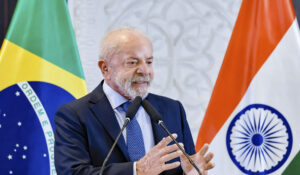
Published 08/29/2024 14:36 | Edited 08/29/2024 14:41
Republican Donald Trump’s campaign has been struggling in recent weeks as Kamala Harris’s name begins to widen its lead in voting intentions for the US presidential election, according to the latest polls. In recent days, the former president’s campaign has shown indecision about Trump’s participation in debates and has been at odds over the tone of the election campaign.
It was clear that Trump and his advisers feared that current President Joe Biden would withdraw from the race. The day after Biden published his letter announcing his withdrawal from the race, the Republican accused the Democratic Party of posing a threat to democracy.
“They stole the race from Biden after he won the primaries — unheard of! These people are the real THREAT TO DEMOCRACY!” the billionaire posted on his social media account, Truth Social.
The reaction had two objectives. The first was to counter the accusations of authoritarianism that have been leveled at him for his role in attempting to overturn the results of the 2020 election, which culminated in the invasion of the Capitol. The second was to provide proof that his campaign had no defined plan B and was banking on the intransigence and ego of the current White House leader to stay in the race.
A month later, Trump and his advisers continue to butt heads over a series of campaign points, while the Democratic performance, at least at the beginning, remains energized by the new ticket: Kamala Harris, current vice president, and Tim Waltz, governor of Minnesota.
A new Reuters/Ipsos poll released Thursday (29) showed Democrats four points ahead of the Republicans. The difference is 45% to 41%, a number higher than the one percentage point difference in the last poll by the same institute in late July.
So far, the path that has allowed Democrats to pave this difference is clear: while Trump bets on hate speech against minorities, Kamala has sought to establish a class difference between the Democrats, united around the working middle class, and the Republicans, centered on the billionaire figure and his fiscal and tax interests.
The sudden change in the electoral scenario in the United States seems to have stunned Republicans, who no longer find harmony between candidate Trump, apparently enraged by the memory that voters denied him a second term four years ago, and his campaign committee, which seeks to contain the billionaire’s personal attacks on Kamala and other Democrats.
Last week, amid the Democratic National Convention schedule, Republicans carefully planned campaign events aimed at countering Blue Week. But Mr. Trump undercut much of his message with a series of off-the-cuff remarks, rants and blunders that threatened to stoke the kind of Republican anxiety he has spent much of the past month trying to calm.
On Monday (19), in Pennsylvania, he struggled to clarify a comment that the Presidential Medal of Freedom, which honors civilians, was “much better” than the Medal of Honor given to military members.
On Tuesday (20) in Michigan, he said that Vice President Kamala Harris had won the Democratic nomination after a “violent and vicious presidential coup” and called Chicago, which hosted the Democratic convention, “a war zone worse than Afghanistan.”
Trump called the nation’s first black vice president lazy during a stop in Arizona on Thursday afternoon (22) and rambled on during a 10-minute call with Fox News that night. The hosts eventually cut the call and ended the interview, but Trump picked up where he left off by quickly dialing Newsmax.
“One of the ways to win over undecided voters is not through personal attacks — they don’t inherently love partisan politics, but they’re also not thrilled with the direction of the country and the performance of the economy,” said Kevin Madden, a longtime Republican strategist who worked on presidential campaigns in 2004, 2008 and 2012. “And every day Trump isn’t talking about that is a day wasted.”
In this week’s clash, Donald Trump said on Monday (26) that he prefers that the microphones remain on for both candidates at all times during the next presidential debate, organized by ABC News, for September 10.
However, the Republican campaign is pushing for the same rules to be maintained as in the last debate, when microphones were turned off when it was not the candidate’s turn to speak.
“I probably would have preferred to keep them on, but the agreement was to use the same rules as the last debate. At that time, the microphones were muted. I didn’t like it, but it worked out well,” Trump said.
Republican advisers fear that Kamala’s rhetoric could cause Trump to lose control in the middle of the debate and start using the verbiage that the campaign is trying to avoid in order to convince independent and undecided voters.
In tune with the new reality of the electoral race and in a good phase, the Democrats realized that having the microphone on can be bad for their opponents.
“We have told ABC and other networks looking to host a potential debate in October that we believe both candidates’ microphones should be live throughout the broadcast,” said Brian Fallon, senior communications adviser for the Democratic campaign.
“Our understanding is that Trump’s handlers prefer the mic to be muted because they don’t think their candidate can function as president alone for 90 minutes. We suspect that Trump’s team hasn’t even told their boss about this dispute because it would be too embarrassing to admit that they don’t think Trump can handle the debate situation in front of Vice President Harris without the benefit of a mute button,” Fallon added.
Source: vermelho.org.br

